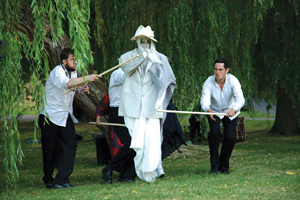Sustainability remains an ill-defined concept. Debbi Christophers has been unpacking it with the help of arts professionals.

There is no doubt that the cultural landscape is at a turning point. The double whammy of the economic crisis and the pace of digitisation, the rise of social media and the growth of what John Holden calls “homemade culture”, has led to the arts struggling to remain both solvent and, indeed, relevant. Joanna Macy has described this as the “The Great Turning” – when everything is up for grabs: our values, our established structures and the way we see the world. What does that mean for the arts? If we are to have a resilient, sustainable sector, do we need to reassess our conventional notions about how an arts organisation operates, what a healthy sector might look like and what role public funders have in developing those goals?
Between February and April last year I asked chief executives, producers and practitioners what sustainability means for them. Conversations spanned audiences, funding, the environment, employment practices and operating models. Away from the world of the cultural policy maker, sustainability isn’t a fixed goal, rather it is maintaining your vision while evolving your model in response to external change. This evolution is manifesting itself in organisations beginning to reinvent their most important relationships – within their organisations, with their audiences and with each other – and consequently challenging some of the assumptions of the past 60 years.
BACK OFFICE POLITICS
The arts rely on their people for success, so it’s ironic that low pay, long hours and little training are the norm – a symptom of what Clare Cooper of Mission, Models, Money calls “the crisis of overextension and undercapitalisation”. At Battersea Arts Centre David Micklem is promoting flexible working and aspiring to a four-day week for staff: “We are increasingly talking about sustainable jobs and sustainable relationships with people – considering issues like how can we help people achieve a decent work/life balance? How can we do less, better?”
Surely creative businesses should apply their creativity to the back office. Yet that’s difficult when the UK cultural scene is almost entirely based on the idea of permanence. If we were starting from scratch, would anybody really invest in the infrastructure we have today, with its high operating costs and fixed models? A positive step is the increase in working across boundaries. Audiences London has brought off-West End theatres together to explore audience development; the Liverpool Arts Regeneration Consortium is looking at shared services; and Mission Models Money has six collaborative working pilots underway in Scotland and the North of England.
JOINING IN
Perhaps the most fascinating shift is in the relationship between the performer/creator and the audience – again, this is about collaboration. Audiences are becoming part of the action and unlearning accepted behaviour. In ‘Democratic Culture: Opening the Arts up to Everyone’, John Holden argues that “culture should be something that we all own or make, not something that is given, offered or delivered from one section of ‘us’ to another”, and more and more theatres are beginning to explore this.
Fuel’s ‘Love Letters Straight from the Heart’ was authored with the audience, who submitted their own love letters to become part of the show. Last month The Albany in Deptford allowed young people to take over the venue in a week-long festival. Through FanMade Theatre, London Bubble gives its audiences a say in the artistic programme; an extension of its belief that “theatre is something that happens between people, not to them,” an idea supported by Charles Leadbeater who, in ‘The Art of With’, argues that the underlying principle of Web 2.0 is doing things “with people rather than to or for them”.
SUSTAIN PEDAL
So, 12 months on, how is the picture looking? There are definitely some positive signs. Lyn Gardner blogged recently about a shift towards collaborative creativity. Arts Council England (ACE) has appointed 150 peer assessors to help evaluate the performance of its Regularly Funded Organisations – a positive move, but would it dare to go that step further and appoint people who are merely punters who would like to contribute to where their public funding goes? And of course we’ve had the extraordinarily un-aptly named Sustain fund which, whilst in theory designed to fund organisations that were willing to “implement change to ensure their long-term sustainability”, in practice seemed merely to prop up those that were well-funded in the first place and ACE feels cannot be allowed to fail.
That’s one of the biggest challenges. If we are to create a sustainable arts sector we need to fundamentally rethink models of funding and operating. That means taking risks. Along the way jobs may be cut and venues may be closed. Funders cannot keep bailing out organisations simply because they are seen as part of the cultural establishment at the expense of those that are genuinely trying to become sustainable. It’s sad that the Institute of Contemporary Arts is fighting for its life, but maybe the grim truth is that it’s past its sell-by date and other, newer players have taken over its mantle.
Each organisation will find its own model, but my personal hope is that the future will be less about doing to and more about doing with; less about competition and more about collaboration; less about structure and more about fluidity; and less about doing too much with not enough and more about doing less better. Change will be imperfect, flawed and messy, but as we face up to an election and the threat of yet more cuts, the status quo is not an option. Evolution or extinction? I know which I’d choose.
DEBBI CHRISTOPHERS is a Senior Consultant with Naomi Russell + Partners.
w http://www.nrandpartners.com
You can read Debbi’s full report on sustainability and the arts at http://www.writeoncommunication.co.uk



